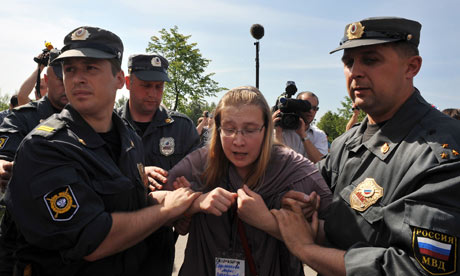Gang attack blamed on Russia's ban on 'gay propaganda'
-
Assault in Moscow club heightens concern as rights groups accuse police of tolerating attacks

Russian police officers detain a gay rights activist in St Petersburg in July after its gay pride rally was banned.
Miriam Elder in Moscow
guardian.co.uk,Alyona Korolyova thought she had seen everything – the lifting of Russia's ban on homosexuality after the Soviet Union fell, the slow appearance of mainstream gay clubs, and even, once, a young gay couple on a TV sitcom.
Then last week, Korolyova, 48, was forced to stand pressed against the wall of a gay-friendly club and watch as a group of burly men, their faces hidden with surgical masks, repeatedly kicked her girlfriend in the head as part of an organised attack.
"I never thought I would live to see this," Korolyova said. "It was like a movie, a nightmare."
The attack on 7freedays, a club in central Moscow, has heightened fears among gay rights activists that new laws targeting "homosexual propaganda" in cities around Russia have created an atmosphere where discrimination – and violence – against gay people is now tolerated.
"The authorities have given a command – that such attacks will not be punished, that we are a group to be hated," Korolyova said.
The incident took place last week during a celebration of the internationally observed National Coming Out Day. Despite the club's serpentine hallways, the men knew which room to run to, and divided up in planned formation, patrons said.
"At around 9.30pm, a group of masked men ran by me, yelled: 'This fight has been ordered' and began overturning tables, throwing chairs and beating whomever fell under their hands," Andrei Obolensky said. The attack lasted five minutes. Four people – three women and one man – were treated in hospital and at least a dozen left with cuts and bruises.
The attack is one of several to have been reported since Russian cities began adopting the laws amid a wider government initiative to push for ultraconservative policies. Discrimination is even more widespread. Gay pride marches are regularly banned in Russia and this summer, Moscow's highest court banned gay pride parades in the capital for 100 years.
Eight Russian regions have banned so-called "homosexual propaganda" in the past year – Arkhangelsk, Ryazan, Kostroma, Magadan, Novosibirsk, Krasnodar, Bashkortostan and, most controversially, St Petersburg, Russia's second city and its cultural capital.
A bill on a national ban has been submitted to the Duma, the Russian parliament.
Igor Kochatkev, the head of LGBT Network, a St Petersburg-based gay rights advocacy, said: "Of course there is a link – we see that whenever such laws on propaganda are adopted, or even discussed, then the activism of violent groups increases."
The day after the law was adopted in St Petersburg in March, a group of men attacked one of its most popular gay clubs, Malevich. Similar attacks were recorded in the city in May and June, according to LGBT Network.
The attack on 7freedays came a day after People's Council, a nationalist group, called on authorities in Moscow to ban "homosexual propaganda".
Oleg Kassin, a member of the group, denied any link to the attack. "We don't go down the path of violence," he said. "Only the path of law. We are working to create a necessary legal basis, the necessary laws." He accused LGBT activists of organising the attack themselves to raise their profile.
Kassin said People's Council, an anti-immigrant pro-church group, worked with "friendly deputies" to push for the passage of anti-gay laws. One such deputy is Vitaly Milonov, an outspoken and religious MP in the St Petersburg legislature who has become the face of Russia's anti-gay movement.
He has supported charging Madonna with promoting "homosexual propaganda" after an August concert in St Petersburg where she spoke out in support of gay rights. A city court has demanded the pop star appears for a hearing into the charges – she has not responded.
"Homosexuality is a sickness. It must be treated like a tooth that hurts," said Milonov, who put forward the St Petersburg law this year.
According to the Levada Centre, an independent pollster, many Russians agree. A poll taken in July found 32% of Russians saw homosexuality as "a sickness or the result of a psychological trauma" – 43% saw it as "debauchery or a bad habit".
Milonov plays to those views, while pushing for the interests of Russia's Orthodox Christians.
It is no wonder gay rights activists feel threatened. "We see these new laws being adopted," said Obolensky, "and then many clerical representatives and nationalists say that LGBT people are sick and need to be healed. This raises the level of intolerance in society".
Korolyova, who was in the Moscow club at the time of the attack, said that she would not change her behaviour: "We will not go underground. We will not hide."
-
This is so horrible …